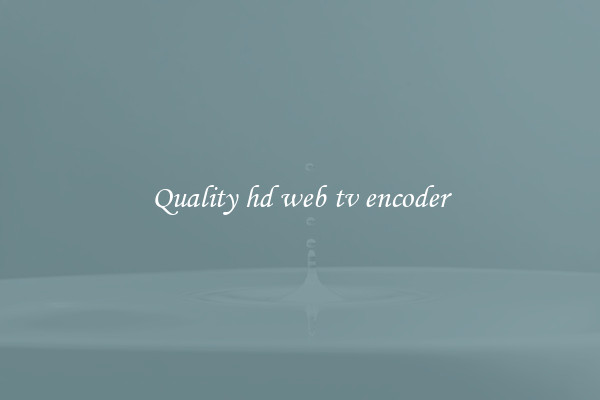Quality hd web tv encoder
When it comes to web TV broadcasting, having a high-quality encoder is crucial to ensure optimal streaming quality and viewer satisfaction. With the rise in internet-based television platforms, viewers have high expectations for a seamless and immersive viewing experience. Therefore, it is essential for broadcasters to invest in a quality HD web TV encoder that can meet these expectations.

One of the key features of a HD web TV encoder is the ability to encode video content in high-definition (HD) format. With the advancement in technology, viewers now demand a higher resolution and crystal-clear imagery. A top-notch HD encoder can handle the intense processing required to compress and deliver video in the best possible quality, ensuring a visually stunning experience for the end-user.
Another important aspect of a quality HD web TV encoder is its ability to handle multiple bitrates and adaptive streaming. Adaptive streaming is a technique that allows the video delivery to adjust the quality based on the viewer's internet connection speed. This is crucial as it ensures a smooth playback experience regardless of the viewer's internet capabilities. A good encoder will automatically detect the connection speed and adjust the video quality in real-time, ensuring optimized streaming for each viewer.
Furthermore, a high-quality encoder should support various video codecs, such as H.264 and HEVC (High-Efficiency Video Coding). These codecs efficiently compress the video without compromising on its quality, resulting in reduced bandwidth requirements and faster streaming speeds. By using such advanced codecs, broadcasters can deliver high-quality content even with limited internet bandwidth, allowing for a broader audience reach.
In addition to video optimization, a quality HD web TV encoder should also provide options for audio encoding. A high-quality audio stream enriches the viewing experience, adding depth and immersion to the content. Look for encoders that support various audio codecs, such as AAC (Advanced Audio Coding), to maintain the audio quality while keeping the overall file size manageable.
Lastly, compatibility and ease of use should not be overlooked while choosing a HD web TV encoder. Ensure that the chosen encoder is compatible with the streaming platforms and content management systems (CMS) you use. Additionally, a user-friendly interface and intuitive controls can greatly simplify the encoding process, making it accessible even for non-technical users.
In conclusion, investing in a quality HD web TV encoder is paramount for delivering high-quality streaming to viewers. Look for encoders that support HD video, adaptive streaming, advanced video and audio codecs, and offer compatibility with the desired streaming platforms and CMS. By choosing a quality HD web TV encoder, broadcasters can provide an exceptional viewing experience that keeps viewers coming back for more.

View details

View details

View details

View details








